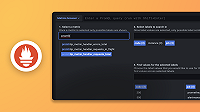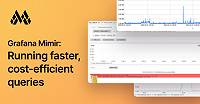This is documentation for the next version of Mimir. For the latest stable release, go to the latest version.
Deploy Grafana Mimir with Puppet
A puppet module is community maintained to deploy Grafana Mimir. This module use the deb or rpm packages to install Grafana Mimir.
Start using this module
Add this module to your Puppetfile:
mod 'ovhcloud-mimir', '1.0.0'Install and configure Mimir
Call the main class of the module inside a puppet manifest like this:
class{'mimir': }If called like this, this module will use the default configuration parameters of Mimir and therefore start mimir in standalone mode.
To customize the configuration, just add a hash with the appropriate configuration key like this:
class {'mimir':
config_hash => {
target => 'querier',
},
}Configuration parameters
# Mimir version under the form X.X.X or one of the supported puppet values
# as 'present', 'latest', ...
[package_ensure: <string> | default = "present"]
# Boolean to specify if module should manage mimir user
[manage_user: <boolean> | default = false]
# Home directory for the managed user
# Only if manage_user is set to true
[user_home: <string> | default = "/var/lib/mimir"]
# Binary to use as shell for managed user
# Only if manage_user is set to true
[user_shell: <string> | default = "/sbin/nologin"]
# Additionnal groups the managed user should be connected to
# Only if manage_user is set to true
[user_extra_groups: <array> | default = []]
# Directory to store the mimir configuration
[config_dir: <string> | default = "/etc/mimir"]
# Group to use for configuration resources
[config_group: <string> | default = "mimir"]
# Hash containing the configuration keys to override
[config_hash: <hash> | default = {}]
# Owner to use for configuration resources
[config_owner: <string> | default = "mimir"]
# Additional arguments to set to the mimir process
[custom_args: <array> | default = []]
# Directory to store mimir logs if log to file is enabled
# Only if log_to_file is set to true
[log_dir_path: <string> | default = "/var/log/mimir"]
# Mode of the directory used to store logs
# Only if log_to_file is set to true
[log_dir_mode: <string> | default = "0700"]
# Filename to store mimir logs if log to file is enabled
# Only if log_to_file is set to true
[log_file_path: <string> | default = "mimir.log"]
# Mode of the file used to store logs
# Only if log_to_file is set to true
[log_file_mode: <string> | default = "0600"]
# Group to use for log resources
# Only if log_to_file is set to true
[log_group: <string> | default = "root"]
# Log level to use for process mimir
[log_level: <string> | default = "info"]
# Owner to use for log resources
# Only if log_to_file is set to true
[log_owner: <string> | default = "root"]
# Should log be kept in journald or sent to a dedicated file
[log_to_file: <boolean> | default = false]
# Command use to validate configuration
[validate_cmd: <string> | default = "/usr/local/bin/mimir --modules=true"]
# Command use to restart/reload process
[restart_cmd: <string> | default = "/bin/systemctl reload mimir"]
# Should the process be restarted on configuration changes
[restart_on_change: <boolean> | default = false]
# List of systemd parameters to override
[systemd_overrides: <hash> | default = {'Service' => {'LimitNOFILE' => '1048576'}}]


